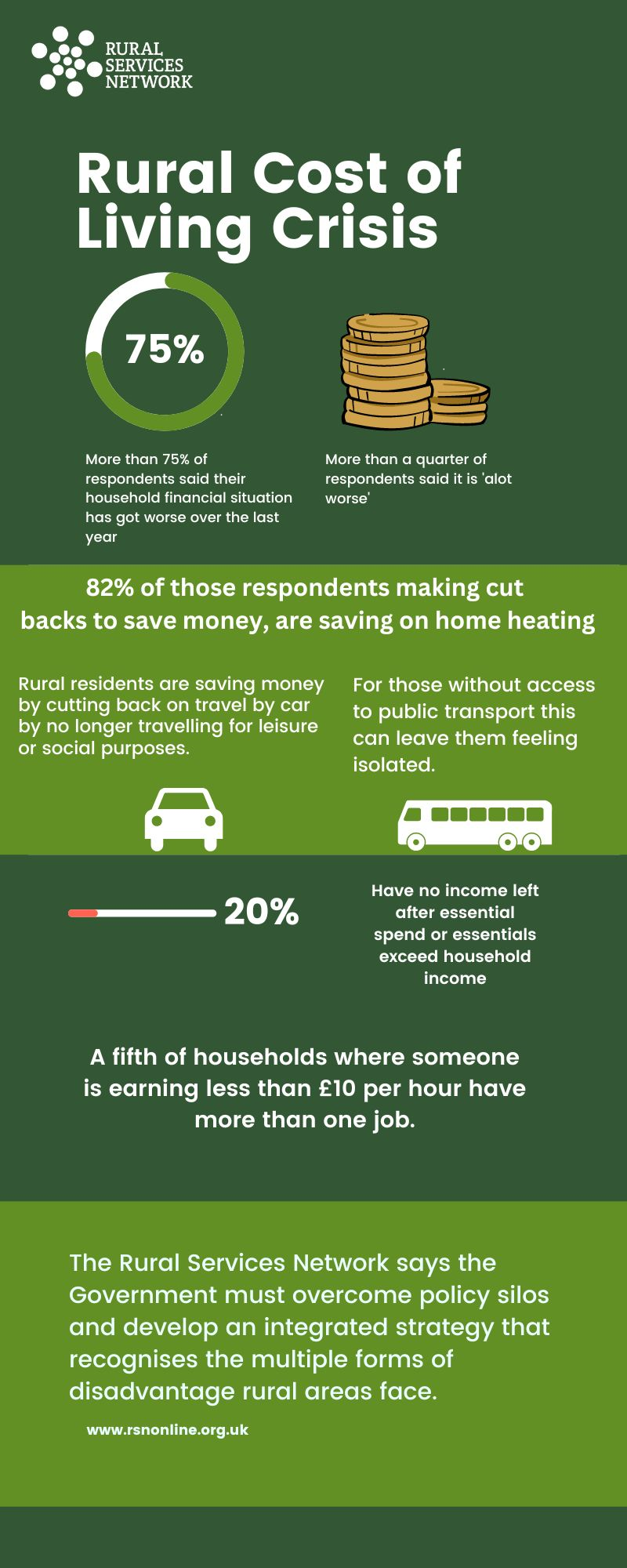T: 01822 851370 E: [email protected]
Rural households left feeling isolated by the cost of living crisis

A survey of rural households out today by the Rural Services Network (RSN), shows that more than 75% of respondents say that their financial situation has got worse over the last year. The RSN, which represents rural councils and other rural service providers, conducted the survey with the Rural Issues Group of Citizens Advice to better gauge the impact of the cost of living crisis on households in rural areas across England.
Responses to the online household survey were received by a staggering 6,780 rural residents in a clear demonstration of the severity of the situation.
Headline findings of the survey showed:
- After paying for essentials, two thirds of respondents are in households with a little income left over for other things. However, a fifth of respondents live either in households with no income left over, or in households where the essentials alone exceed their income. These essentials included rent or mortgage, food and drink, essential car or travel costs and childcare.
- Rural residents are cutting back on spending across the board and this is especially true for low income households where notable examples are reduced spending on home heating (90%) and visits to hospitality venues (91% of such households).
The survey highlighted concerning findings where rural households cited ways they are trying to save on home heating costs, such as wearing more clothing, sitting underneath blankets or duvets, running heating for shorter periods and living in fewer rooms. Some describe how the constant cold is affecting their physical health or mental wellbeing.
The survey followed initial research commissioned by the RSN last year, (Rural Cost of Living Emergency) which found that rural communities were facing a triple blow in the cost of living crisis, as higher domestic and transport energy poverty, coupled with lower wages, pushes rural areas into a cost of living emergency.
The survey echoed these findings, with rural residents citing ways that they were trying to save on car running costs, such as dropping non-essential journeys, making fewer visits to family or friends and planning multi-purpose journeys. Some describe how this has left them feeling socially isolated.
Rural residents often rely on their car for journeys due to a lack of public transport and this creates an additional burden on household’s finances as a result.
Nick Hubbard from the Rural Issues Group of Citizens Advice says:
"This report has our enthusiastic support. It is consistent with the experience of our clients. And it is derived from an up-to-date study of the perspectives of a variety of real people.
Its most important point is that one in 25 households doesn’t have enough income to pay for essentials. But it paints an accurate - worrying - picture of increasing misery for many more rural families with low incomes."
Kerry Booth, Chief Executive of the Rural Services Network, comments:
"We are extremely grateful to our members and other rural groups for supporting us with this survey. The cost of living is a significant issue for all people and businesses across England, but rural areas have systematically faced higher costs and disadvantages compared to urban counterparts, which is leaving rural communities more vulnerable.
The Government must overcome policy silos and develop an integrated strategy that recognises the multiple forms of disadvantage rural areas face. We need targeted measures to tackle the low wage levels and reliance on seasonal employment in rural areas along with support to ensure that rural houses can become more energy efficient to help get families out of fuel poverty. Many rural homes which are off the gas network are more difficult and costly to heat and insulate.
We are concerned that the situation for rural communities will only get worse, especially with interest rates rising, and without action, our rural communities risk being left isolated and vulnerable."




